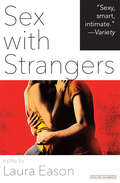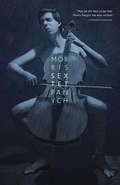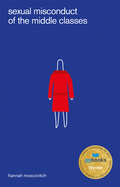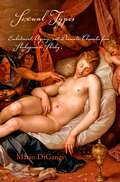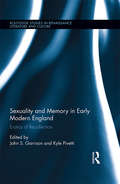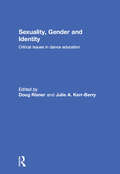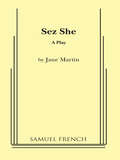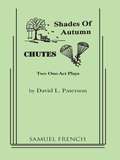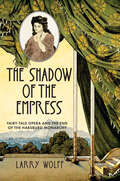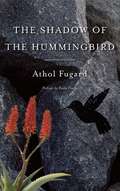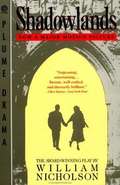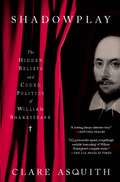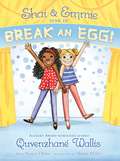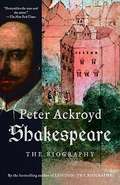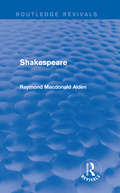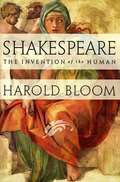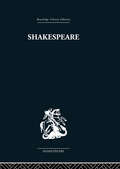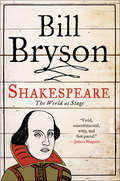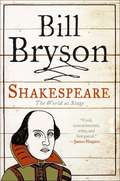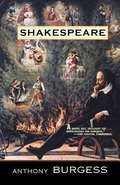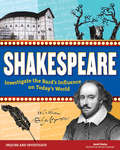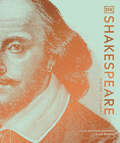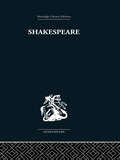- Table View
- List View
Sex with Strangers
by Laura EasonHow far will you go to get what you want? Will you be the same person if you finally do? When star sex blogger and memoirist Ethan, 24, tracks down his idol, the gifted but obscure 40ish novelist Olivia, he finds they each crave what the other possesses. As attraction turns to sex, and they inch closer to getting what they want, both must confront the dark side of ambition and the near impossibility of reinventing oneself when the past is only a click away. Sex with Strangers had its world premiere at Steppenwolf Theatre Company; it will have its New York premiere at Second Stage Theatre in June 2014, directed by David Schwimmer.
Sextet
by Morris Panych"The best script Morris Panych has ever written."?Toronto StarA blizzard strands six musicians in their motel with only their instruments, each other, and their secrets to keep them warm. Where will everyone sleep when everyone is sleeping with everyone else? Morris Panych is internationally recognized as one of North America's master playwrights.
Sexual Misconduct of the Middle Classes
by Hannah MoscovitchThe archetypal student-teacher romance is cleverly turned on its head for the post-#MeToo era in this striking new play by the acclaimed author of What a Young Wife Ought to Know and Bunny. Jon, a star professor and author, is racked with self-loathing after his third marriage crumbles around him when he finds himself admiring a student—a girl in a red coat. The girl, nineteen-year-old Annie, is a big fan of his work, and also happens to live down the street. From their doorways to his office to hotel rooms, their mutual admiration and sexual tension escalates under Jon’s control to a surprising conclusion that will leave you wanting to go back and question your perceptions of power as soon as you finish.
Sexual Politics in the Work of Tennessee Williams
by Michael S. D. HooperMichael S. D. Hooper reverses the recent trend of regarding Tennessee Williams as fundamentally a social writer following the discovery, publication and/or performance of plays from both ends of his career – the 'proletarian' apprentice years of Candles to the Sun and Not About Nightingales and the once overlooked final period of, amongst many other plays, The Red Devil Battery Sign. Hooper contends that recent criticism has exaggerated the political engagement and egalitarian credentials of a writer whose characters and situations revert to a reactionary politics of the individual dominated by the negotiation of sexual power. Directly, or more often indirectly, Williams' writing expresses social disaffection before glamorising the outcast and shelving thoughts of political change. Through detailed analysis of canonical texts the book sheds new light on Williams' work, as well as on the cultural and social life of mid-twentieth-century America.
Sexual Types: Embodiment, Agency, and Dramatic Character from Shakespeare to Shirley
by Mario DiGangiSexual types on the early modern stage are at once strange and familiar, associated with a range of "unnatural" or "monstrous" sexual and gender practices, yet familiar because readily identifiable as types: recognizable figures of literary imagination and social fantasy. From the many found in early modern culture, Mario DiGangi here focuses on six types that reveal in particularly compelling ways, both individually and collectively, how sexual transgressions were understood to intersect with social, gender, economic, and political transgressions.Building on feminist and queer scholarship, Sexual Types demonstrates how the sodomite, the tribade (a woman-loving woman), the narcissistic courtier, the citizen wife, the bawd, and the court favorite function as sites of ideological contradiction in dramatic texts. On the one hand, these sexual types are vilified and disciplined for violating social and sexual norms; on the other hand, they can take the form of dynamic, resourceful characters who expose the limitations of the categories that attempt to define and contain them. In bringing sexuality and character studies into conjunction with one another, Sexual Types provides illuminating new readings of familiar plays, such as Shakespeare's A Midsummer Night's Dream and The Winter's Tale, and of lesser-known plays by Fletcher, Middleton, and Shirley.
Sexuality and Memory in Early Modern England: Literature and the Erotics of Recollection (Routledge Studies in Renaissance Literature and Culture)
by John S. Garrison Kyle PivettiThis volume brings together two vibrant areas of Renaissance studies today: memory and sexuality. The contributors show that not only Shakespeare but also a broad range of his contemporaries were deeply interested in how memory and sexuality interact. Are erotic experiences heightened or deflated by the presence of memory? Can a sexual act be commemorative? Can an act of memory be eroticized? How do forms of romantic desire underwrite forms of memory? To answer such questions, these authors examine drama, poetry, and prose from both major authors and lesser-studied figures in the canon of Renaissance literature. Alongside a number of insightful readings, they show that sonnets enact a sexual exchange of memory; that epics of nationhood cannot help but eroticize their subjects; that the act of sex in Renaissance tragedy too often depends upon violence of the past. Memory, these scholars propose, re-shapes the concerns of queer and sexuality studies - including the unhistorical, the experience of desire, and the limits of the body. So too does the erotic revise the dominant trends of memory studies, from the rhetoric of the medieval memory arts to the formation of collective pasts.
Sexuality, Gender and Identity: Critical Issues in Dance Education
by Doug Risner and Julie A. Kerr-BerrySexuality is a difficult topic for all educators. Dance teachers and educators are not immune to these educational challenges, especially given the large number of children, adolescents, and young adults who pursue dance study and performance. Most troubling is the lack of serious discourse in dance education and the development of educative strategies to promote healthy sexuality and empowered gender identities in proactive ways. This volume, focused on sexuality, gender, and identity in dance education, expands this developing area of study and investigates diverse perspectives from public schools, private sector dance studios and schools, as well as college and university dance programs. By openly bringing issues of sexuality and gender to the forefront of dance education and training, this book straightforwardly addresses critical challenges for engaged educators interested in age appropriate content, theme and costume; the hyper-sexualization of children and adolescents; sexual orientation and homophobia; the hidden curriculum of sexuality and gender; sexual identity; the impact of contemporary culture; and mass media, and sexual exploitation. The original research provides a frank discussion, highlighting practical applications and offering insights and recommendations for today’s educational environment in dance. This book was originally published as a special issue of the Journal of Dance Education.
Sez She
by Jane MartinFull Length, Comedy. . Characters: 5 female. Bare stage with chairs. Written to be performed by five actresses, this sequel to Jane Martin's last monologue play picks up where VITAL SIGNS left off - in these funnier, stranger days of the 21st century. Reveling in virtues of brevity that include hilarity, surprise and homespun philosophy, these monologues roam the range of contemporary perspective on everything from sexual harassment to sleeping in theaters to the erotic appeals of silence. Whether biking across Massachusetts with 23,000 lawyers or reflecting on the meaning of a Pekinese dog with a picket fence stake through its heart, these characters know how to take the stage and make the most of their five minutes of fame.
Shades of Autumn & Chutes
by David PatersonShades of Autumn: After not seeing his father for many years, Douglas is alerted by a worried neighbor and returns to his childhood home where his elderly parent is displaying signs of senility. Douglas relocates his father into a small apartment near his own. The move triggers an emotional journey through time as Douglas growing up with his emotionally distant and gruff yet caring father. Scenes traverse three decades of joy and pain, regrets and discoveries. Chutes: In a distant nation during a recent war, two wayward American paratroopers are trapped by their chute strings in the jungle canopy miles behind enemy lines. The green recruit and the grizzled veteran prove to be much alike in their personal agonies and desire to survive as they are captured, imprisoned, hospitalized to recover and returned home.
The Shadow of the Empress: Fairy-Tale Opera and the End of the Habsburg Monarchy
by Larry WolffA beguiling exploration of the last Habsburg monarchs' grip on Europe's historical and cultural imagination. In 1919 the last Habsburg rulers, Emperor Karl and Empress Zita, left Austria, going into exile. That same year, the fairy-tale opera Die Frau ohne Schatten (The Woman Without a Shadow), featuring a mythological emperor and empress, premiered at the Vienna Opera. Viennese poet Hugo von Hofmannsthal and German composer Richard Strauss created Die Frau ohne Schatten through the bitter years of World War I, imagining it would triumphantly appear after the victory of the German and Habsburg empires. Instead, the premiere came in the aftermath of catastrophic defeat. The Shadow of the Empress: Fairy-Tale Opera and the End of the Habsburg Monarchy explores how the changing circumstances of politics and society transformed their opera and its cultural meanings before, during, and after the First World War. Strauss and Hofmannsthal turned emperors and empresses into fantastic fairy-tale characters; meanwhile, following the collapse of the Habsburg monarchy after the war, their real-life counterparts, removed from political life in Europe, began to be regarded as anachronistic, semi-mythological figures. Reflecting on the seismic cultural shifts that rocked post-imperial Europe, Larry Wolff follows the story of Karl and Zita after the loss of their thrones. Karl died in 1922, but Zita lived through the rise of Nazism, World War II, and the Cold War. By her death in 1989, she had herself become a fairy-tale figure, a totem of imperial nostalgia. Wolff weaves together the story of the opera's composition and performance; the end of the Habsburg monarchy; and his own family's life in and exile from Central Europe, providing a rich new understanding of Europe's cataclysmic twentieth century, and our contemporary relationship to it.
The Shadow of the Hummingbird
by Athol Fugard Paula Fourie"The greatest active playwright in the English-speaking world."--Time"If there is a more urgent and indispensable playwright in world theater than South Africa's Athol Fugard, I don't know who it could be."--Newsweek"Athol Fugard can say more with a single line than most playwrights convey in an entire script."--VarietyLegendary theatre artist Athol Fugard returns to the stage for the first time in fifteen years in this, his latest work. The Shadow of the Hummingbird tells the story of an ailing man in his eighties and the afternoon spent with his ten year-old grandson. In a charming meditation on the beauty and transience of the world around us, Fugard continues to mine the depths of the human spirit with profound empathy and heart. The text of the play includes an introductory Prelude by Paula Fourie with extracts from Fugard's unpublished notebooks.Athol Fugard has been working in the theater as a playwright, director, and actor for more than fifty years. In 2011, he received a Special Tony Award for Lifetime Achievement in the Theatre, and he was the inaugural Humanitas Visiting Professor of Drama at Oxford University. His plays include Blood Knot, Boesman and Lena, Statements After an Arrest Under the Immorality Act, Sizwe Banzi Is Dead, 'Master Harold' . . . and the Boys, The Road to Mecca, My Children! My Africa! and The Blue Iris.
Shadowlands
by William NicholsonDramatizes the relationship between the British writer and his American wife, whose death was a turning point in his philosophical outlook
Shadowplay
by Clare AsquithIn 16th century England many loyal subjects to the crown were asked to make a terrible choice: to follow their monarch or their God. The era was one of unprecedented authoritarianism: England, it seemed, had become a police state, fearful of threats from abroad and plotters at home. This age of terror was also the era of the greatest creative genius the world has ever known: William Shakespeare. How, then, could such a remarkable man born into such violently volatile times apparently make no comment about the state of England in his work? He did. But it was hidden. Revealing Shakespeare's sophisticated version of a forgotten code developed by 16th-century dissidents, Clare Asquith shows how he was both a genius for all time and utterly a creature of his own era: a writer who was supported by dissident Catholic aristocrats, who agonized about the fate of England's spiritual and political life and who used the stage to attack and expose a regime which he believed had seized illegal control of the country he loved. Shakespeare's plays offer an acute insight into the politics and personalities of his era. And Clare Asquith's decoding of them offers answers to several mysteries surrounding Shakespeare's own life, including most notably why he stopped writing while still at the height of his powers. An utterly compelling combination of literary detection and political revelation, Shadowplay is the definitive expose of how Shakespeare lived through and understood the agonies of his time, and what he had to say about them.
Shai & Emmie Star in Break an Egg! (A Shai & Emmie Story #1)
by Sharee Miller Nancy Ohlin Quvenzhané WallisFrom Academy Award–nominated actress Quvenzhané Wallis comes the first story in a brand-new series about best friends Shai and Emmie, two third graders destined for superstardom.Shai Williams was born to be a star (or a veterinarian—and maybe a dentist). She attends a special elementary school for the performing arts, and her grandma Rosa and aunt Mac-N-Cheese are both actresses. So Shai is shocked when she doesn’t get the lead role in the third-grade musical. Instead, the part goes to the new girl, Gabby Supreme, who thinks she is better than everyone else. To add insult to injury, Ms. Gremillion has now asked Shai to help Gabby with the role. Shai reluctantly agrees and enlists Emmie to help, but Gabby isn’t going to make it easy. As opening night draws near, Shai discovers that making a new friend is sometimes like putting on a show—it requires dedication, patience, and lots and lots of practice.
Shakespeare: The Biography
by Peter AckroydThis is the big one from Peter Ackroyd — and a worthy companion toLondon: The Biography. Only Peter Ackroyd can combine readable narrative and unique observation with a sharp eye for the fascinating fact. His method is to position Shakespeare in the close context of his world. In this way, he not only richly conjures up the texture of Shakespeare’s life, but also imparts an amazing amount of vivid, interesting material about place, period and background. Some snippets: Shakespeare was secretly a Roman Catholic; the witches in Macbeth were not hags but nymphs played by boys; the “best” bed was for guests which was why he bequeathed his wife his “second best” bed (the matrimonial bed in which he probably died); “ham acting” derives from the strutting walk which showed off the ham-strings; an actor called “Will” played female parts — could it have been Shakespeare himself? And, the strongest bond in the plays is between father and daughter, perhaps reflecting Shakespeare’s own family life. From the Hardcover edition.
Shakespeare: From The Quarto Of 1609, With Variorum Readings And Commentary (Routledge Revivals)
by Raymond Macdonald AldenThis fascinating title, first published in 1922, presents a detailed overview of the life and works of Shakespeare. Alden first considers Shakespeare’s Elizabethan context, alongside exploring the Classical and Italian foundations, political theories, concepts and theatrical trends that influenced his works. Next, a comprehensive biography provides insight into Shakespeare’s probable education, relationships and contemporaries. The final sections are devoted to the genres into which Shakespeare’s works have been categorised, with full analyses of and backgrounds to the poems, histories, comedies and tragedies. An important study, this title will be of particular value to students in need of a comprehensive overview of Shakespeare’s life and works, as well as the more general inquisitive reader.
Shakespeare: The Invention of the Human
by Harold Bloom"Shakespeare: The Invention of the Human is an analysis of the central work of the Western canon, and of the playwright who not only invented the English language, but also, as Bloom argues, created human nature as we know it today. Before Shakespeare there was characterization; after Shakespeare, there were characters, men and women capable of change, with highly individual personalities." "Shakespeare: The Invention of the Human is a companion to Shakespeare's work, and just as much an inquiry into what it means to be human. It explains why Shakespeare has remained our most popular and universal dramatist for more than four centuries, and in helping us to better understand ourselves through Shakespeare, it restores the role of the literary critic to one of central importance in our culture."--BOOK JACKET.Title Summary field provided by Blackwell North America, Inc. All Rights Reserved
Shakespeare: The Poet in his World
by M. C. BradbrookFirst published in 1978. In this study, Shakespeare's own life story and the development of English theatrical history are placed in the wider context of Elizabethan and Jacobean times, but the works themselves are the final objective of this 'applied biography'. The main contention of the book is that Shakespeare's life was the lure of the stage itself which inspired him to transform what everyday life provided into the worlds of Hamlet, King Lear and Prospero.
Shakespeare: The World as Stage
by Bill BrysonBill Bryson's bestselling biography of William Shakespeare takes the reader on an enthralling tour through Elizabethan England and the eccentricities of Shakespearean scholarship--updated with a new introduction by the author to commemorate the 400th anniversary of Shakespeare's deathWilliam Shakespeare, the most celebrated poet in the English language, left behind nearly a million words of text, but his biography has long been a thicket of wild supposition arranged around scant facts. With a steady hand and his trademark wit, Bill Bryson sorts through this colorful muddle to reveal the man himself. His Shakespeare is like no one else's--the beneficiary of Bryson's genial nature, his engaging skepticism, and a gift for storytelling unrivaled in our time.
Shakespeare: The World as Stage
by Bill BrysonAmerican native Bryson, alive and well in England, sets out what little is known about the life of the Elizabethan playwright and samples the voluminous scholarship about his work and its influence on English as a language and a body of literature. His approach is lighthearted and non-technical. Annotation ©2008 Book News, Inc., Portland, OR (booknews.com)
Shakespeare
by Anthony BurgessLike Burgess's early novel, Nothing Like the Sun: A Story of Shakespeare's Love-Life, this equally delightful factual treatment of what we know of the Bard combines Burgess's stimulating erudition and his well-informed imagination. The result is at once a speculative biography, a theatrical history, and a re-creation of the Elizabethan age. Whether a vivid retracing of the evolution Elizabethan theater, a bravura reconstruction of the first performance of Hamlet, an infiltration of the intricacies of the court of the Virgin Queen, or an elegy on the era's end with the distrastrous Essex Rebellion, Burgess -- author of the classic A Clockwork Orange -- sets the stage for England's most glorious time and turns the spotlight on the figure of William Shakespeare. <p><p>"Animated by affection and an understanding of the creative imagination that only a creative writer can bring to bear."—Atlantic Monthly<p> "A smooth-flowing narrative, often enlivened by Anthony Burgess's Joycean appetite for linguistic fantasy."—Economist<p> "Bright, racy...knowledgeable and humorous, alternately sensible and quirky."—Terry Eagleton, Commonweal <p>"Burgess's wonderfully well-stocked mind and essentially wayward spirits are just right for summoning up an apparition of the Bard...."—Daily Telegraph
Shakespeare: Investigate the Bard's Influence on Today's World
by Andi Diehn Samuel Carbaugh"Romeo, Romeo, wherefore art thou Romeo?" Teenagers have been sighing an approximation of these words for centuries, ever since William Shakespeare had Juliet utter them from her balcony in one of the most popular plays of all time, Romeo and Juliet. Tales of love, loss, rebellion, rivalry-before there was Twilight, Warm Bodies, and The Lion King, there was Shakespeare. The characters, language, imagery, and plot elements of many books and movies that appear on bookshelves and in cinemas today are directly influenced by the plays of the Bard.In Shakespeare: Investigate the Bard's Influence on Today's World, readers discover links between the books, movies, and music they listen to today and the words that were written and acted out more than 400 years ago. Readers deconstruct Shakespearean themes, imagery, language, and meaning by finding familiar ground on which to gain literary insight. Through hands-on projects such as coding a video game based on one of Shakespeare's plays to rewriting a scene in the text language of emoji, readers find compelling avenues into the dramatic, sometimes intimidating language, leaving them well-equipped to tackle any major text in the academic years to come.
Shakespeare
by Mark Van Doren34 chapters of critical and interpretative comment on each of the Bard's plays with another chapter on his poems
Shakespeare: His Life and Works (DK Ultimate Guides)
by Leslie Dunton-Downer Alan RidingA comprehensive collection of the life and works of a literary great — William Shakespeare!The beautifully illustrated guide unravels the life and works of Shakespeare and his plays, from language, history, and themes to plays, poems, and sonnets. Explore the art of this famous playwright and his enduring legacy through the stunning gift format.Celebrate one of the theaters most influential contributors through his legendary works of comedy, tragedy, romance, and poetry. Inside this playbook, you&’ll find: • A clear and accessible format. • Plot summaries of all 39 plays with lists of characters. • Guidance on how to read and interpret his great sonnets and narrative poems. • Plays ordered by time and genre, helping readers trace the development of Shakespeare&’s topics, themes, and artistry. • Sidebars that clarify the mythological, geographical and historical context of each play and decode its language, dramatic action, and themes. • Illuminated guidance on how to approach reading the play and seeing it perform.Shakespeare fans will revel in the marvelous depiction of the Stratford-upon-Avon born Bard himself! His drama book allows you to dive into famous works like Hamlet, Romeo and Juliet, and A Midsummer Night&’s Dream, and explore Shakespeare&’s sources and inspirations for each! Themes, plots, characters, and language are brought to life with act-by-act plot summaries, resumes of main characters, and in-depth analysis of Shakespeare&’s use of the English language. Shakespeare: His Life and Works is a wonderful exploration of plays, poems, and sonnets in the context of his life and the Elizabethan and Jacobean theatre, further enriching your on the page (or stage, or screen!) experience.
Shakespeare: The Cambridge Dover Wilson Shakespeare (cambridge Library Collection. Literary Studies) (Cambridge Dover Wilson Shakespeare Ser. #Vol. 17)
by George Ian DuthieFirst published in 1951. 'The book has the sterling qualities of shrewd sense and acumen that mark the 'rational' classical school of Shakespeare criticism.' Notes and Queries 'Professor Duthie's approach is direct and extremely objective. With no axe to grind, he pays impartial court to most of the great schools of Shakespearian criticism.' Cambridge Daily News 'Professor Duthie has much to say that is wise and judicious'. Times Literary Supplement. Contents include: Shakespeare's Characters and Truth to Life; Shakespeare and the Order-Disorder Antithesis; Comedy; Imaginative Interpretation and Troilus and Cressida; History; Tragedy; The Last Plays.
